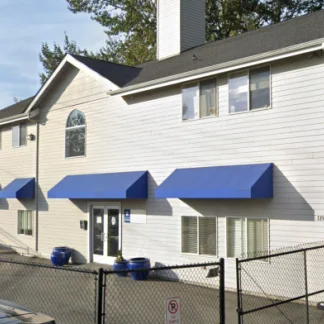Cascade Behavioral Health Hospital
Cascade Behavioral Health Hospital is located in Tukwila, WA. Cascade Behavioral...
Pioneer’s Co-occurring Residential Program (CORP) is a drug and alcohol rehab located in Seattle, Washington. They provide residential treatment for substance abuse and co-occurring mental health disorders.
Addiction-related services provided at Pioneer include a co-occurring substance abuse and mental health residential program.
Inpatient Addiction Treatment This residential program is for individuals who have been diagnosed with a substance use disorder and a mental health disorder. The program lasts between 60 and 90 days. Components include motivational interviewing, trauma intervention, process groups, relapse prevention, DBT groups, anger management classes, basic living skills, nutrition education, coping skills, and discharge preparation.
Contact us for more information: (206) 772-6900

Connect with Pioneer’s Co-occurring Residential Program (CORP) by calling their admissions team directly.
(206) 772-6900 Website Get DirectionsGroup therapy is any therapeutic work that happens in a group (not one-on-one). There are a number of different group therapy modalities, including support groups, experiential therapy, psycho-education, and more. Group therapy involves treatment as well as processing interaction between group members.
In individual therapy, a patient meets one-on-one with a trained psychologist or counselor. Therapy is a pivotal part of effective substance abuse treatment, as it often covers root causes of addiction, including challenges faced by the patient in their social, family, and work/school life.
Life skills trainings involve all the skills a person must have in order to function successfully in the world. These include time management, career guidance, money management, and effective communication. Truly successful addiction recovery is based on the ability to not only live substance-free, but to thrive. Life skills teaches the practical necessities of functioning in society, which sets clients up for success in life, and therefore sobriety.
In individual therapy, a patient meets one-on-one with a trained psychologist or counselor. Therapy is a pivotal part of effective substance abuse treatment, as it often covers root causes of addiction, including challenges faced by the patient in their social, family, and work/school life.
Life skills trainings involve all the skills a person must have in order to function successfully in the world. These include time management, career guidance, money management, and effective communication. Truly successful addiction recovery is based on the ability to not only live substance-free, but to thrive. Life skills teaches the practical necessities of functioning in society, which sets clients up for success in life, and therefore sobriety.
Life skills trainings involve all the skills a person must have in order to function successfully in the world. These include time management, career guidance, money management, and effective communication. Truly successful addiction recovery is based on the ability to not only live substance-free, but to thrive. Life skills teaches the practical necessities of functioning in society, which sets clients up for success in life, and therefore sobriety.
Cascade Behavioral Health Hospital is located in Tukwila, WA. Cascade Behavioral...
Therapeutic Health Services (THS) - Rainier Branch is a nationally accredited, n...
New Traditions is a private rehab located in Seattle, Washington. New Traditions...
Burien Lakeside Milam Recovery Center is a private rehab located in Seattle, Was...